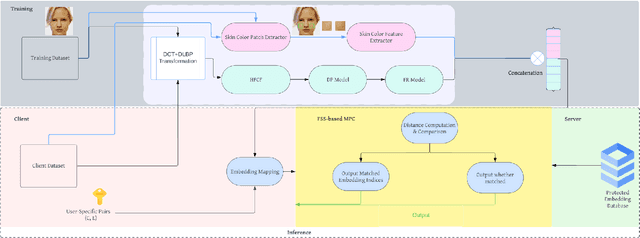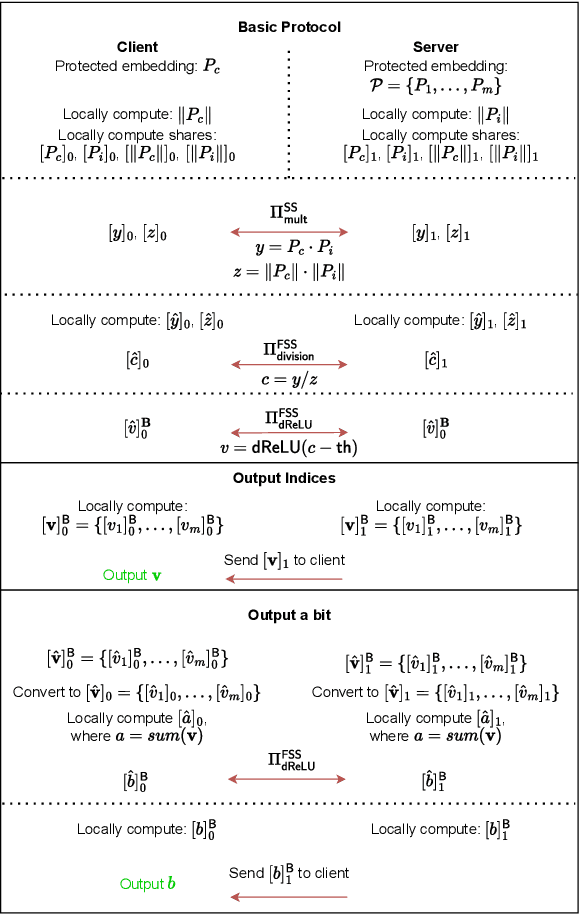Ricardo Mendes
PrivacyScalpel: Enhancing LLM Privacy via Interpretable Feature Intervention with Sparse Autoencoders
Mar 14, 2025



Abstract:Large Language Models (LLMs) have demonstrated remarkable capabilities in natural language processing but also pose significant privacy risks by memorizing and leaking Personally Identifiable Information (PII). Existing mitigation strategies, such as differential privacy and neuron-level interventions, often degrade model utility or fail to effectively prevent leakage. To address this challenge, we introduce PrivacyScalpel, a novel privacy-preserving framework that leverages LLM interpretability techniques to identify and mitigate PII leakage while maintaining performance. PrivacyScalpel comprises three key steps: (1) Feature Probing, which identifies layers in the model that encode PII-rich representations, (2) Sparse Autoencoding, where a k-Sparse Autoencoder (k-SAE) disentangles and isolates privacy-sensitive features, and (3) Feature-Level Interventions, which employ targeted ablation and vector steering to suppress PII leakage. Our empirical evaluation on Gemma2-2b and Llama2-7b, fine-tuned on the Enron dataset, shows that PrivacyScalpel significantly reduces email leakage from 5.15\% to as low as 0.0\%, while maintaining over 99.4\% of the original model's utility. Notably, our method outperforms neuron-level interventions in privacy-utility trade-offs, demonstrating that acting on sparse, monosemantic features is more effective than manipulating polysemantic neurons. Beyond improving LLM privacy, our approach offers insights into the mechanisms underlying PII memorization, contributing to the broader field of model interpretability and secure AI deployment.
PII-Scope: A Benchmark for Training Data PII Leakage Assessment in LLMs
Oct 09, 2024



Abstract:In this work, we introduce PII-Scope, a comprehensive benchmark designed to evaluate state-of-the-art methodologies for PII extraction attacks targeting LLMs across diverse threat settings. Our study provides a deeper understanding of these attacks by uncovering several hyperparameters (e.g., demonstration selection) crucial to their effectiveness. Building on this understanding, we extend our study to more realistic attack scenarios, exploring PII attacks that employ advanced adversarial strategies, including repeated and diverse querying, and leveraging iterative learning for continual PII extraction. Through extensive experimentation, our results reveal a notable underestimation of PII leakage in existing single-query attacks. In fact, we show that with sophisticated adversarial capabilities and a limited query budget, PII extraction rates can increase by up to fivefold when targeting the pretrained model. Moreover, we evaluate PII leakage on finetuned models, showing that they are more vulnerable to leakage than pretrained models. Overall, our work establishes a rigorous empirical benchmark for PII extraction attacks in realistic threat scenarios and provides a strong foundation for developing effective mitigation strategies.
Robust Skin Color Driven Privacy Preserving Face Recognition via Function Secret Sharing
Jul 06, 2024



Abstract:In this work, we leverage the pure skin color patch from the face image as the additional information to train an auxiliary skin color feature extractor and face recognition model in parallel to improve performance of state-of-the-art (SOTA) privacy-preserving face recognition (PPFR) systems. Our solution is robust against black-box attacking and well-established generative adversarial network (GAN) based image restoration. We analyze the potential risk in previous work, where the proposed cosine similarity computation might directly leak the protected precomputed embedding stored on the server side. We propose a Function Secret Sharing (FSS) based face embedding comparison protocol without any intermediate result leakage. In addition, we show in experiments that the proposed protocol is more efficient compared to the Secret Sharing (SS) based protocol.
ObfuscaTune: Obfuscated Offsite Fine-tuning and Inference of Proprietary LLMs on Private Datasets
Jul 03, 2024Abstract:This work addresses the timely yet underexplored problem of performing inference and finetuning of a proprietary LLM owned by a model provider entity on the confidential/private data of another data owner entity, in a way that ensures the confidentiality of both the model and the data. Hereby, the finetuning is conducted offsite, i.e., on the computation infrastructure of a third-party cloud provider. We tackle this problem by proposing ObfuscaTune, a novel, efficient and fully utility-preserving approach that combines a simple yet effective obfuscation technique with an efficient usage of confidential computing (only 5% of the model parameters are placed on TEE). We empirically demonstrate the effectiveness of ObfuscaTune by validating it on GPT-2 models with different sizes on four NLP benchmark datasets. Finally, we compare to a na\"ive version of our approach to highlight the necessity of using random matrices with low condition numbers in our approach to reduce errors induced by the obfuscation.
PII-Compass: Guiding LLM training data extraction prompts towards the target PII via grounding
Jul 03, 2024



Abstract:The latest and most impactful advances in large models stem from their increased size. Unfortunately, this translates into an improved memorization capacity, raising data privacy concerns. Specifically, it has been shown that models can output personal identifiable information (PII) contained in their training data. However, reported PIII extraction performance varies widely, and there is no consensus on the optimal methodology to evaluate this risk, resulting in underestimating realistic adversaries. In this work, we empirically demonstrate that it is possible to improve the extractability of PII by over ten-fold by grounding the prefix of the manually constructed extraction prompt with in-domain data. Our approach, PII-Compass, achieves phone number extraction rates of 0.92%, 3.9%, and 6.86% with 1, 128, and 2308 queries, respectively, i.e., the phone number of 1 person in 15 is extractable.
IncogniText: Privacy-enhancing Conditional Text Anonymization via LLM-based Private Attribute Randomization
Jul 03, 2024



Abstract:In this work, we address the problem of text anonymization where the goal is to prevent adversaries from correctly inferring private attributes of the author, while keeping the text utility, i.e., meaning and semantics. We propose IncogniText, a technique that anonymizes the text to mislead a potential adversary into predicting a wrong private attribute value. Our empirical evaluation shows a reduction of private attribute leakage by more than 90%. Finally, we demonstrate the maturity of IncogniText for real-world applications by distilling its anonymization capability into a set of LoRA parameters associated with an on-device model.
 Add to Chrome
Add to Chrome Add to Firefox
Add to Firefox Add to Edge
Add to Edge